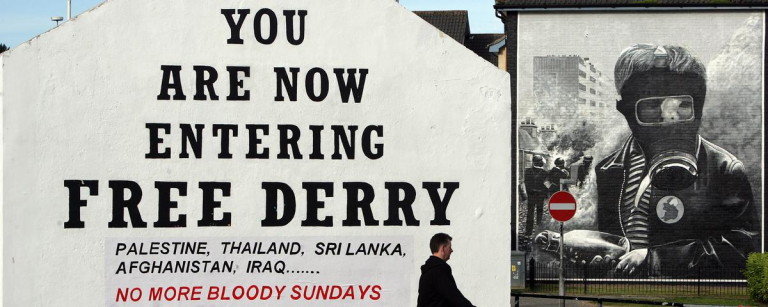This year marked the 46th anniversary of Bloody Sunday in Derry. On the 30th of January 1972 the British Army shot 28 people, killing 14, during a march calling for civil rights and an end to internment. This atrocity, carried out by the Parachute Regiment, was a watershed moment. The murder of innocent people in broad daylight sent shockwaves across Ireland and the world, revealing the vicious nature of British state-violence in the North. It should never be forgotten.
On Sunday 28th January, we were again on the streets of Derry to restate our commitment to fighting for justice for the victims of Bloody Sunday and against state repression both here and world-wide.
Why We Marched on Bloody Sunday
Relentless, determined and brave campaigning by the families and supporters of those massacred on Bloody Sunday forced the British government to come clean, following decades of lies and cover-ups, and admit their state forces committed an atrocity. This was a remarkable achievement.
The British state continues to protect those who are responsible for the atrocity and the subsequent cover-up—from those in government and military brass who ordered the intervention of Troops that led to the slaughter, to those sent in to pull the triggers. As long as those responsible are not held to account justice is denied.
46 years later and the British Government are still playing an obstructionist role in the struggle for truth and justice. And Bloody Sunday is not an isolated case, as evidenced by the Tory pursuit of blanket impunity for British soldiers involved in the conflict, or their refusal to come clean around the Ballymurphy massacre. This is why we keep marching.
We keep marching, too, because the basic issues of state repression have not gone away either. Tony Taylor and others remain locked up in a similar system of internment without trial that people marched against 46 years ago. Stop and Search laws are abused daily by the PSNI. And across the world the issues of injustice continue, from Grenfell to Black Lives Matter—one world, one struggle. This is what the Bloody Sunday march is about.
We marched and encouraged others to do so in order that Bloody Sunday is never forgotten; to demand those responsible be held to account; and to oppose state violence and repression today in Ireland and across the world.
Defending the Bloody Sunday March
The Bloody Sunday March has always been a key date in the calendar for the movement for civil rights and justice, and against state repression. And for this reason the march has always come under attack by those who would like to see it go away. There is a long history of this.
For many years, for example, the Bloody Sunday march was attacked for being a “Provo front.” This was because of the participation of key SF figures. Socialists might have had disagreements with SF, but we never allowed it to stop us participating in the march. After SF abandoned the annual march, those who continued to demonstrate were labelled “dissidents” and “wreckers”. Again, socialists did not let these attacks deter us from helping to build a broad campaign for justice.
At every juncture the main force that wanted to see the march go away was the establishment, and those who do their bidding. Despite these attacks the annual march has continued to thrive, as has the Bloody Sunday week of events. This is to the credit of the families and their supporters who have continued to organise and campaign.
Opposing the Latest Attacks
Shamefully, the Bloody Sunday march and the committee that organises it, has again come under attack, this time by the IRSP and Saoradh. These parties have now decided to follow the example of Sinn Féin and boycotted the march this year—claiming that the committee has come under the “coercive influence” of Eamonn McCann, People Before Profit and the SWP.
This is insulting to the diverse organising committee and its tireless work in campaigning for justice. Jeopardising an event as crucial as the Bloody Sunday March with baseless claims and nonsensical accusations is reckless, irresponsible and shameful—just as it was when SF did the same.
That Eamonn McCann is a member of People Before Profit is no secret. However, he is not part of the Bloody Sunday March Committee because he is a member of People Before Profit. Eamonn was an organiser of the march in 1972 and, as many will know, has been a relentless campaigner for the victims on Bloody Sunday since the massacre occurred. It was Eamonn’s proposal to the families that led to the setting up of the Bloody Sunday Justice Campaign in 1992; this campaign was crucial to getting the Saville Tribunal. His efforts to uncover the truth about the atrocity through his journalism saw him given the Amnesty International Media Award in 2011. For good reason he was described as ‘a thorn’ in the side of the establishment.
Eamonn would be the first to say that he is far from the only person to have campaigned around this issue, not least the families themselves, some of whom remain as the key organisers of the event now under attack. But given Eamonn’s record of campaigning around Bloody Sunday, we challenge any reasonable person to explain why he should not be involved in the event, even centrally involved.
Keep Up the Fight for Justice
People Before Profit feel no need to speak for the Bloody Sunday March Committee. They can answer the specificity of attacks themselves, or how they came about making the decisions they did, should they wish.
We were reluctant to add comment on the ugly attacks on the Bloody Sunday organising committee and on People Before Profit in the weeks leading into the march since the objective of those attacking it was to create a fractious and divisive atmosphere undermining the march itself.
We did not abandon the march when it came under attack in the past, and we encouraged others not to abandon it now. Our commitment to building a campaign for justice for the Bloody Sunday families and all victims of state sponsored violence remains steadfast. We commend everyone who marched this year and – if justice isn’t won – we will work with all who stand in solidarity with the Bloody Sunday families, and other campaigns against state repression, to build the broadest possible support over the next year.












